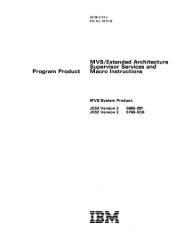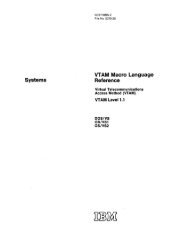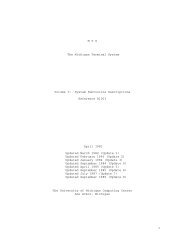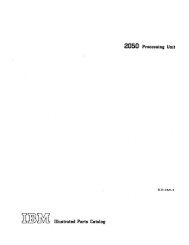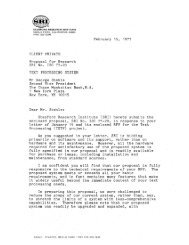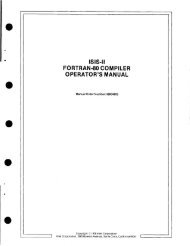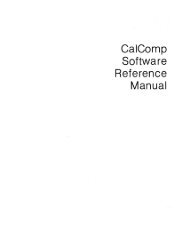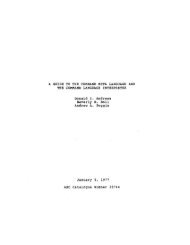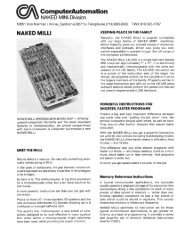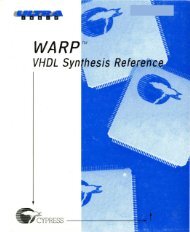TOPS-20 PASCAL Language Manual - Bitsavers
TOPS-20 PASCAL Language Manual - Bitsavers
TOPS-20 PASCAL Language Manual - Bitsavers
Create successful ePaper yourself
Turn your PDF publications into a flip-book with our unique Google optimized e-Paper software.
<strong>PASCAL</strong> DATA TYPES<br />
Example 2<br />
VAR Cit~_Census : PACKED ARRAY [1 •• 25J OF 2500 •• 50000;<br />
J : I NTEGEF: i;<br />
BEGIN<br />
FOI:< I: : :~: :L TO 2~:.:j DO<br />
C 1. t ~~ .... C (.:~ n sus I:: I] ! :=: ();<br />
END;<br />
This example declares the variable City Census as a 25-element array<br />
of integer values in the subrange from ~500 through 50000. A value of<br />
a is assigned to each element of the array.<br />
2.6 TYPE COMPATIBILITY<br />
Type compatibility rules determine the operations and assignments that<br />
you can perform with data items of different types. Two scalar types<br />
are compatible if their type identifiers are declared equivalent in<br />
the TYPE section. In addition, a subrange type is compatible with its<br />
base type, and two subranges of the same base type (or equivalent base<br />
types) are compatible.<br />
For structured and pointer types, <strong>PASCAL</strong> enforces structural<br />
compatibility. Two structured (that is, arrays, records, files, and<br />
sets) or pointer types are compatible if their structures are<br />
identical.<br />
The way <strong>PASCAL</strong> determines structural compatibility depends<br />
types involved. For instance, the requirements for<br />
compatibility differ from those for array compatibility.<br />
on the<br />
record<br />
<strong>PASCAL</strong> uses compatibility rules in the fo]lowing three contexts:<br />
1. Expression compatibility<br />
2. Assignment compatibility<br />
3. Formal and actual parameter compatibility<br />
Expression compatibility determines the types of operands you can<br />
in an expression. See Chapter 3 for information on expressions.<br />
use<br />
Assignment compatibility determines the types of values you can assign<br />
to variables of each type. Assignment compatibility rules apply to<br />
value initializations, assignment statements, and value parameters.<br />
Assignment compatibility is described with the assignment statement in<br />
Section 5.2.<br />
Formal and actual parameter compatibility determines the types of data<br />
you can pass in a parameter list. Value parameters follow the rules<br />
for assignment compatibility. Variable parameters follow somewhat<br />
different rules. Value and variable parameters are described in<br />
Chapter 6.<br />
2-29



